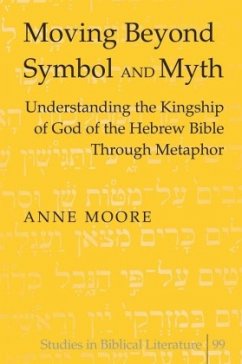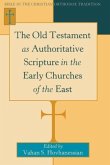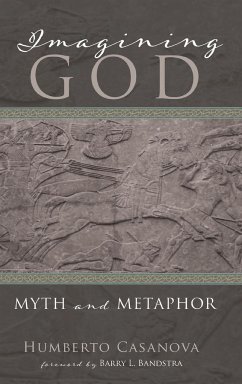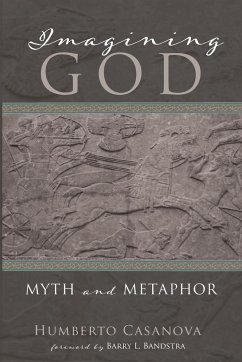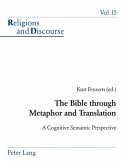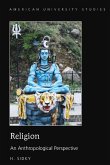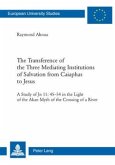For hundreds of years, scholars have debated the meaning of Jesus' central theological term, the 'kingdom of God'. Most of the argument has focused on its assumed eschatological connotations and Jesus' adherence or deviation from these ideas. Within the North American context, the debate is dominated by the work of Norman Perrin, whose classification of the kingdom of God as a myth-evoking symbol remains one of the fundamental assumptions of scholarship. According to Perrin, Jesus' understanding of the kingdom of God is founded upon the myth of God acting as king on behalf of Israel as described in the Hebrew Bible.
Moving Beyond Symbol and Myth challenges Perrin's classification, and advocates the reclassification of the kingdom of God as metaphor. Drawing upon insights from the cognitive theory of metaphor, this study examines all the occurrences of the 'God is king' metaphor within the literary context of the Hebrew Bible. Based on this review, it is proposed that the 'God is king' metaphor functions as a true metaphor with a range of expressions and meanings. It is employed within a variety of texts and conveys images of God as the covenantal sovereign of Israel; God as the eternal suzerain of the world, and God as the king of the disadvantaged. The interaction of the semantic fields of divinity and human kingship evoke a range of metaphoric expressions that are utilized throughout the history of the Hebrew Bible in response to differing socio-historical contexts and within a range of rhetorical strategies. It is this diversity inherent in the 'God is king' metaphor that is the foundation for the diversified expressions of the kingdom of God associated with the historical Jesus and early Christianity.
Moving Beyond Symbol and Myth challenges Perrin's classification, and advocates the reclassification of the kingdom of God as metaphor. Drawing upon insights from the cognitive theory of metaphor, this study examines all the occurrences of the 'God is king' metaphor within the literary context of the Hebrew Bible. Based on this review, it is proposed that the 'God is king' metaphor functions as a true metaphor with a range of expressions and meanings. It is employed within a variety of texts and conveys images of God as the covenantal sovereign of Israel; God as the eternal suzerain of the world, and God as the king of the disadvantaged. The interaction of the semantic fields of divinity and human kingship evoke a range of metaphoric expressions that are utilized throughout the history of the Hebrew Bible in response to differing socio-historical contexts and within a range of rhetorical strategies. It is this diversity inherent in the 'God is king' metaphor that is the foundation for the diversified expressions of the kingdom of God associated with the historical Jesus and early Christianity.
«'Moving Beyond Symbol and Myth' is a stunning revision of Norman Perrin's work on the 'kingdom of God'. Guided by recent cognitive theory that approaches metaphors as sentences, Anne Moore's comprehensive analysis of texts that imply that 'God is king' challenges the dominant view that all kingdom of God texts are eschatological. As a result of the careful assessment of the semantic fields in virtually all the pertinent texts in 'Tanakh', Pseudepigrapha, and Apocrypha on the basis of their topic domain and vehicle field, this book sets a new standard for analysis and interpretation of kingdom texts.» (Vernon K. Robbins, Professor of New Testament and Comparative Sacred Texts, Emory University)
«Anne Moore returns to the primary sources to analyze the concept of the 'kingdom of God' in the Hebrew Bible. She argues that Norman Perrin's explanation of the kingdom of God in the teaching of Jesus is flawed, and hence inadequate to explain the data in the Hebrew Bible. Drawing on developments in the discussion of metaphor in literary criticism since 1960, Moore argues that 'kingdom of God' is a cognitive metaphor and a means to communicate some understanding about the nature of God and reality rather than being an imprecise trope referencing a myth-evoking symbol. 'Moving Beyond Symbol and Myth' is a well-written, lucid, and important study challenging the past thirty years of New Testament scholarship.» (Charles W. Hedrick, Emeritus Distinguished Professor, Missouri State University)
«Anne Moore returns to the primary sources to analyze the concept of the 'kingdom of God' in the Hebrew Bible. She argues that Norman Perrin's explanation of the kingdom of God in the teaching of Jesus is flawed, and hence inadequate to explain the data in the Hebrew Bible. Drawing on developments in the discussion of metaphor in literary criticism since 1960, Moore argues that 'kingdom of God' is a cognitive metaphor and a means to communicate some understanding about the nature of God and reality rather than being an imprecise trope referencing a myth-evoking symbol. 'Moving Beyond Symbol and Myth' is a well-written, lucid, and important study challenging the past thirty years of New Testament scholarship.» (Charles W. Hedrick, Emeritus Distinguished Professor, Missouri State University)

